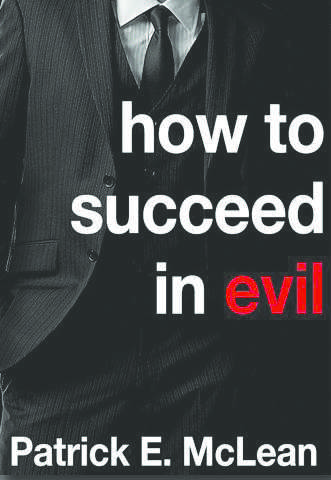 Edwin Windsor is not a super villain. True, he has the perfect name for it, as well as the additional prerequisites of extraordinary wealth, cold hyper-rationality, impeccable taste in suits, a flawless golf game and a vicious attorney for a henchman. But that could describe any number of the successful business overlords those disgruntled Occupy Wall Street protesters despise, right? So whatever the appearances, Edwin Windsor is not a super villain. He simply advises them.
Edwin Windsor is not a super villain. True, he has the perfect name for it, as well as the additional prerequisites of extraordinary wealth, cold hyper-rationality, impeccable taste in suits, a flawless golf game and a vicious attorney for a henchman. But that could describe any number of the successful business overlords those disgruntled Occupy Wall Street protesters despise, right? So whatever the appearances, Edwin Windsor is not a super villain. He simply advises them.
This is the leading man in Patrick E. McLean’s novel “How to Succeed in Evil” (without really trying). And as our Mr. Windsor is not a conventional protagonist, neither is “How to Succeed in Evil” a conventional novel. For one thing, you won’t find it in proud stacks of glossy hardcover books in the checkout line at Barnes & Noble (or any other brick-and-mortar bookstore, for that matter). At the moment, you can’t get it in paper at all. McLean’s very clever, very funny, very smart superhero story is also very, very independent.
“How to Succeed in Evil” is one of the growing number of indie novels by new authors, self-published in electronic formats like Amazon’s Kindle e-books. But don’t let that dissuade you from picking it up (virtually, of course). While a disappointing number of self-published books rightly deserve the name “vanity presses,” McLean’s novel soars over the mass of mediocrity like a bird, a plane or Windsor’s cape-wearing nemesis Excelsior.
I’ll admit, there were some pretty bizarre proofreading errors. Like one spot where I couldn’t tell if the word was supposed to be “air” or “aether.” But that’s what professional copy editors are for, and if this book takes off — as I think it deserves to — then maybe next time McLean publishes a book, he can get one. And in any case, the occasional typo isn’t too distracting, considering just how good the quality of storytelling is.
Edwin Windsor, as I said, is not a super villain — or, at least, he doesn’t want to be. He finds violence distasteful, secret lairs vulgar and grandiose schemes of “giant lasers in space,” for example, quite banal. When confronted by the strongest man in the world, Edwin wants to put him to work as a one-man demolition team. And in Edwin’s mind, the most profitable use of zombies would be as a cheap, easily replaceable factory labor force. But as the consultant finds, his clients tend to be — in the highly frustrating fashion of wannabe super villains — a little too megalomaniacal to take his good advice. They just won’t listen to reason.
And thus Edwin commissions a sinister (but immaculately tailored) black suit and decides that maybe consulting isn’t his calling. “In a time gone mad,” he thinks to himself, “the only sane thing to do is take over the world.”
Naturally, havoc and hilarity ensue.
In “How to Succeed in Evil,” Patrick McLean breaks the mold. Yes, I know, I know, postmodernist anti-heroes are so common these days as to be almost cliché, but Windsor and Co. are truly outside of the box. Just try to find me another novel with a cast like this — Agnes Plantagenet (that’s right, history majors, Plantagenet), Edwin’s more-English-than-bulldogs-and-bad-teeth secretary; “Dr. Loeb,” a trust fund baby from Alabama with some serious mommy problems (understandable, considering that his mother is a delusional Southern belle who wants either the South, or Napoleonic France, to rise again); an obscenity-shouting, vertically-challenged lawyer with a Napoleon complex of his own; and Excelsior, the emotionally unstable American Hero with his chain-smoking handler Gus.
I promise, you’ll never find another novel like this one.
Readers might also like: “Johannes Cabal the Necromancer,” by Jonathan L. Howard; “Sandman Slim,” by Richard Kadrey; “The Sad Tale of the Brothers Grossbart,” by Jesse Bullington









